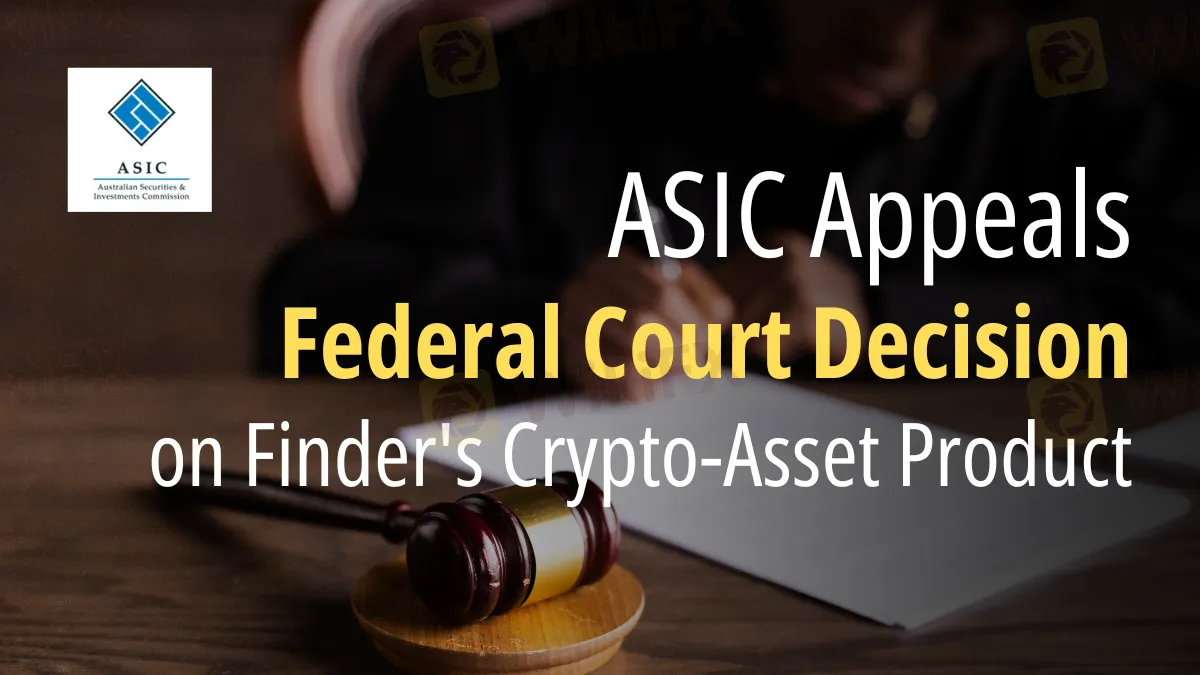简体中文
繁體中文
English
Pусский
日本語
ภาษาไทย
Tiếng Việt
Bahasa Indonesia
Español
हिन्दी
Filippiiniläinen
Français
Deutsch
Português
Türkçe
한국어
العربية
ASIC Appeals Federal Court Decision on Finder's Crypto-Asset Product
Abstract:ASIC appeals a court decision on Finder's crypto-asset product. Concerns over consumer protection and licensing of Finder Earn.

ASIC will appeal the Federal Court's decision to dismiss Finder's crypto-asset product proceedings. The regulator is worried about consumer protection and Finder Earn licensing.
The court dismissed ASIC's complaint against Finder in March regarding the classification of Finder Earn as a financial product. ASIC had raised concerns about Finder providing unlicensed financial services, breaching product disclosure requirements, and failing to comply with design and distribution obligations (DDO) related to Finder Earn.
ASIC alleged that between February and November 2022, Finder Earn customers deposited Australian dollars, which were converted into a stablecoin called TAUD and allocated to Finder Wallet for working capital. Customers received an annual compounding return of either 4.01 percent or, in some cases, 6.01 percent in Australian dollars.
Despite ASIC's claims, the court ruled that Finder Earn was not a debenture and that Finder had not contravened the law, leading to the dismissal of the proceedings. Justice Brigitte Markovic stated, “ASIC has not established that the Finder Earn product is a debenture within the meaning of s9 of the Corporations Act.”

ASIC stated that it would contest the court's ruling because consumer protection remained a priority. “The Australian Securities and Investments Commission (ASIC) has appealed this decision because it is concerned that the Finder Earn product was sold without the right license or authorization, denying consumers important protections,” according to the ASIC. As a result, ASIC will file an appeal. Nobody has said when the appeal meeting will be.
This move by ASIC follows its earlier success in a case against fintech company Block Earner, where the Federal Court found Block Earner engaged in unlicensed financial services conduct. Even though they won, the court did not agree with ASIC's claim that Block Earner's changeable return crypto asset-based service, called the Access Product, was a financial product.
The Access Product was a financial product to ASIC since it let people get loans from open finance. However, the court disagreed, highlighting the complexities surrounding the regulatory classification of crypto-related products.
Australia is implementing regulatory modifications about financial services and digital assets in response to the Finder case and previous judicial rulings concerning crypto asset products. The outcomes of these cases are likely to have broad effects on both market participants and customers, as they will have an impact on the future rules that govern Australia's booming crypto economy.
About ASIC
Financial services, markets, and business are within the jurisdiction of ASIC in Australia. ASIC was created in 1998 by the Australian Securities and Investments Commission Act and is responsible for monitoring and controlling Australia's financial services and markets. Through the promotion of fair and transparent markets, ASIC regularly monitors a variety of institutions, including corporations, financial service providers, auditors, and fund managers, to safeguard consumers and promote investor confidence. ASIC handles licensing, compliance, enforcement, and consumer education. ASIC's proactive regulatory strategy and stakeholder cooperation help protect Australia's financial system and promote market innovation and efficiency.

Disclaimer:
The views in this article only represent the author's personal views, and do not constitute investment advice on this platform. This platform does not guarantee the accuracy, completeness and timeliness of the information in the article, and will not be liable for any loss caused by the use of or reliance on the information in the article.
Read more

Coinbase Under Scrutiny Amid Wrapped Bitcoin Delisting Controversy
Coinbase has come under fire after announcing its decision to delist Wrapped Bitcoin (wBTC), a move critics claim could be driven by competitive interests. The delisting, set to take effect on 19 December, has sparked allegations of market manipulation and concerns about fairness in the cryptocurrency ecosystem.

Solana Soars to All-Time High, Hits $264 on Coinbase
Solana hits $264 on Coinbase, breaking its 3-year high with an 11% daily surge. Learn what’s driving SOL's meteoric rise and the crypto market rally.

Mastercard Partners with JPMorgan for B2B Cross-Border Payments
Mastercard and JPMorgan's Kinexys Digital Payments join forces to enhance B2B cross-border payments, promising faster settlements and greater transparency.

Bitcoin Nears $100,000: A Triumph of Optimism or a Warning Sign?
Bitcoin’s meteoric rise continues to capture global attention as its price recently surpassed the $99,000 mark, briefly approaching the $100,000 milestone. This unprecedented rally has led market sentiment to reach a state of “extreme greed,” according to the Fear and Greed Index. Analysts suggest that the market may be entering overheated territory, raising questions about sustainability amidst ongoing enthusiasm.
WikiFX Broker
Latest News
What Makes Cross-Border Payments Easier Than Ever?
Trader Exposes Unethical Practices by STP Trading
Italian Regulator Warns Against 5 Websites
Currency Calculator


